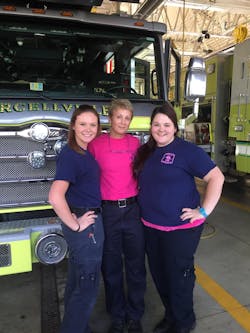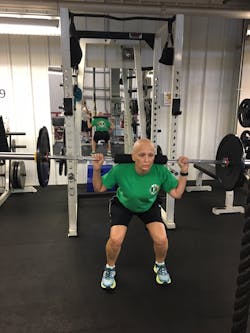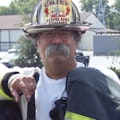Close Calls: The Far-Reaching Impact of Cancer
Occupational cancer poses a significant risk for a close call or line-of-duty death (LODD) for all firefighters. To underscore the danger, last month I introduced you to Loudoun County, VA, Firefighter-Technician Cathy McCray, who was diagnosed with Stage III ovarian cancer only six weeks after getting perfect results during her annual work physical.
Cathy shared her heart-wrenching story of battling the disease, the emotional toll of being a “fixer” who could not “fix” her cancer, and the lessons learned from her experience. Additionally, while we as firefighters are focused on taking care of others, we often forget about the impact of our actions and our profession on others. With that in mind, in this month’s column, we share powerful words from Cathy’s colleagues and family members.
Comments from System Chief Keith Johnson
Having a member die in the line of duty is the hardest part of being a fire chief. Watching a member suffer in pain, knowing that there is little that can be done to ease that pain, is the second hardest part. Perhaps equally hard is the challenge of wondering whether you have done absolutely everything possible to reduce the likelihood of suffering an LODD.
I often hear that our culture is what needs to change. While exactly true, I believe it is changing at least in our system. No drop SCBA policies, on-scene decon, hood exchange programs, second sets of PPE, PPE cleaning programs, and enhanced mandatory medical testing and physicals are some of the ways our culture is changing. In Loudoun County, I am lucky to have the support of my board of supervisors and my county administrator in making firefighter health and safety the number one priority. I wish that every fire chief could enjoy this relationship. Educate, educate, educate.
Cathy’s story is tremendously compelling, not only because of her strength and perseverance, but also because it points to the most dangerous aspect of this incredibly insidious disease: Science has not yet developed a single test that can assess for all forms of cancer. Cathy’s story truly underscores the fact that, despite our most fervent efforts to screen our members for some cancers, we alone cannot assess for all cancers.
We in Loudoun County are working closely with our occupational health provider, in partnership with a leading oncologist, to develop a protocol associated with cancer screening. In the meantime, we continue to test for certain cancers, including colon, prostate, cervical, breast, testicular, skin, bladder, lung, blood and thyroid. There are certain cancers that are incredibly difficult to diagnose, often revealing themselves only in an advanced state when the symptoms become so severe that they demand attention.
Cathy is not the first member of our combined fire and rescue system to be diagnosed with cancer, and although I wish it were otherwise, she will not be the last. I lost my father, Raymond Johnson, 56, due to brain cancer. He was also a firefighter. No one puts out fire or saves a patient from cardiac arrest or from am raging river alone. It takes teamwork. The same is true in combating cancer. It requires all of us to beat this most dangerous disease, but it is a battle worth fighting and one that I know we will win, especially with firefighters like Cathy.
Comments from Battalion Chief Paul Musser, Jr.
Cathy exemplifies the values of most fire departments. She has been a devoted, contributing member of Loudoun County since she was hired. Prior to Loudoun, Cathy volunteered and taught fire programs in West Virginia, which she continues to do, thus proving her dedication to the trade. I feel like people relate someone's worth in this world to what they contribute to society, and as terrible as that sounds, it’s true! Or you hear the comments like, “Why this person? They are such a good person.” The reality is that cancer doesn't care who you are; you must care about yourself.
Fire service members MUST go above and beyond the NFPA physical. Go see a primary care physician and get screened for everything. We spend our entire lives taking care of others and putting others before ourselves. Take just one hour, one day and do something for yourself. Seeing a cancer diagnosis in your department is devastating. It affects a broad range of people and feelings just as a significant injury or death would. Being friends with the person or having them on your shift or in your station just amplifies the effects. Reality hits you right in the face when it's someone you know because every person in the fire service thinks “it” won't happen to me/them, whatever “it” is. It broke my heart to learn of Cathy's diagnosis. She is truly a great person. The potential prognosis for Cathy certainly appeared rather grim at first. Knowing that Cathy persevered though this tough battle to the point of returning to work is something beyond words. It is a testament to her strength and determination.
I'm very proud of Cathy for sharing her story so that it hopefully encourages and motivates her coworkers (and others) to be more proactive. Her case also speaks to the importance of expanding cancer studies in the female work group. It's proven that men in the fire service are at greater risk for cancer than the general population. There is no doubt in my mind that females are at a greater risk, too. Second chances in life do not come easy. I wish Cathy the best of health and strength as she prepares herself to pull on those turnout boots and pants again in the near future. And I urge firefighters everywhere to learn and take action from her close call!
Comments from Lt. Steve Rusenko
I was assigned Engine 602 (Purcellville) in 2016. Cathy was already assigned to the firehouse. Prior to this assignment, I had known Cathy for around 12 years. We attended Recruit Class #14 together, and we were assigned to the same working group throughout the academy.
Cathy has always been one of those people who gives everything she has, not for herself, but to help anyone around her. When I was assigned to Engine 602, it had been a long time since I had seen Cathy, but nothing had changed; she was still 100 percent all the time. Cathy was the technician who you knew could run your shift in your absence. She had a good relationship with everyone on the shift, and did her best at making sure everyone stayed involved with day to day activities. She is the firefighter who does physical training (PT) with the group and then goes and runs an additional two miles while everyone else says they are beat.
When we started getting word of her illness on our shift, everyone immediately started talking. We were shocked. How does this happen to one of the fittest members of the shift? Cathy is the firefighter who watches what she eats at the firehouse and is religious on PT every day. To think that something like this can happen to her makes you really think about your health, including what you haven’t done to make sure everything is OK with you.
I have no doubt that Cathy is going to return to the firehouse unchanged. Cathy will show up her first day and give it 100 percent like nothing ever happened. She has already started being an ambassador for her illness, getting the message out about things she maybe could have done differently, and to not only rely on your county-provided physical every year. This is the type of person she is.
Comments from Cathy’s Sister-in Law, Danielle McCray
Cathy was the epitome of health. I recall her saying that she ran five miles just two days prior to going to the ER. This was part of her regular conditioning, along with hundreds of sit-ups and push-ups each day. The cancer diagnosis just didn’t make sense.
The calls and cards were constant. Flowers filled her window sill, which spanned the entire length of her hospital room. Her firefighter coworkers were a huge support. At one point, I thought we’d be penalized for having so many crowded in the room. The constant flow of visitors helped take her mind off the wait.
We learned of the recent Presumptive Act regarding firefighters diagnosed with cancer, but it seems like there’s a lot of red tape associated with getting approved.
Coworkers have stepped up to cover her shift through something of a shift-swap—shifts that Cathy will in turn need to make up for, though most are adamant that she will do no such thing. Knowing Cathy, though, she will.
Cathy used to be physically strong and financially independent, but her future was suddenly unknown. How does a self-supportive woman suddenly find herself in an unfamiliar dependent situation? I think the financial challenge can be nearly as difficult as the physical challenge for people going health situations of this magnitude. Transportation expenses for doctor’s appointments, co-pays, deductibles, prescription charges, etc., add up. Cathy has always lived beneath her means and is doing OK in this area, but I can only imagine how difficult it is for someone who lives paycheck to paycheck.
November 1, 2018, was a target date for Cathy. That’s when she wanted to return to work. I thought that might be too soon. Her last chemo treatment was Oct. 18, 2018. When I asked her why, she stated that she didn’t want to lose her job and benefits. She was unsure her short-term disability would work. Surely, she wouldn’t lose her job or her benefits or her pay, would she? Could she? What about the Presumptive Act? I’m told that nine times out of 10, the applications are initially denied and need to be appealed. It frustrates me. Cathy deserves to be awarded whatever she is entitled to. If she isn’t the optimal qualified candidate this act was designed for, then who is?
Chemo was set for six treatments, three weeks apart. She was told she would lose her hair. She decided to buzz it off before it had the chance to fall out. This puzzled me. I would have thought that she would want to keep her hair as long as possible. Then I understood: There wasn’t much she had control over at this time, so taking control over her hair was a hint of empowerment. Controlling what she could is what she did.
Just before Cathy’s fourth chemo treatment, her doctor told her that she needed to continue another 20 treatments, above and beyond chemo, with an infusion called Avastin. The finish line moved. The mountain got higher. Her expectations of getting her life back to normal didn’t seem as close as before.
Going through this with Cathy has been a blessing, to both of us, I think, in different ways. We choose to find the good and be thankful, regardless. We educate ourselves, prepare for battle, and march forward until we’re in the clear. It’s not easy, but it’s what must be done. There is no other option.
I’ve learned a lot by watching how Cathy responds under fire, just as she does in the workplace I would expect. She keeps her cool, stays focused on the task at hand, stays positive, and approaches with determination. You should have heard how kind and encouraging she was to the infusion team, even when she had a puke bucket in front of her. True colors show under pressure, and 99 percent of the time, the color I see is kindness and humility.
Cathy is a woman of great character and integrity. I’m sure her couple thousand firefighter supporters would vouch for that as well. I’m so thankful to have her in my life.
Comments from Cathy’s Sister, Sarah Jones
To say that my sister is one of the strongest people I know is a bit of an understatement. She is 13 years older than me, and I have always looked up to her. When we were younger, she stepped up in so many ways to help take care of us and pursue her dream of becoming a firefighter. It's something that has always been in her blood, and I am so proud of how far she has come, not just in her career, but life in general.
With Cathy being such a motivated and determined person, I knew this cancer didn't stand a chance. She has always accomplished everything she has set out to do and beating cancer wasn't going to be any different.
I remember when my sister first started working as a volunteer at our local fire department. A woman trying to do a “man’s job” was frowned upon, and they certainly didn't make it easy on her. Did she quit? Nope, if anything, it motivated her. She worked harder than ever and eventually started her career with Loudoun County Fire & Rescue. This job has not always been easy for Cathy, but she pursues each day with a positive outlook.
Her faith plays a big part in her life as well, and I honestly don't think she would've been able to make it through her diagnosis like she did without it. She is so used to being in control and the one who fixes things, but this forced her to take a big step back and let things play out His way instead of hers.
Cathy is trying to look at her future in a positive light, but this life-altering event will always be a part of her. All I wanted from the very beginning is for her to focus on getting better so she can get back to doing what she loves and now she is doing just that. Her journey through this hasn’t been the easiest, but her future is bright. I look forward to the day this is all in the past, but it will always be a part of us.
I know my sister and this will not hold her back. She will use this for good and inspire and help those she can. They always ask you in school who your hero is. Back then, I didn’t really have an answer. Now, without a doubt, it’s Cathy McCray.
Final thoughts from Chief Goldfeder
We aren’t always good at taking care of ourselves, but I think this becomes much easier to tackle when we step back and consider how our actions—or inactions—could ultimately impact the people we love, including our brother and sister firefighters. So once again, I implore you to look at the pictures in your smartphone, in your wallet or posted in your locker. How would they be impacted by you not taking care of yourself? Now, take action!
My sincere thanks to Loudoun County Firefighter-Technician Cathy McCray for sharing her genuine “wake-up” story with us, and thank you to her colleagues and family who shared their comments, as well as all those who supported Cathy through her cancer battle.
About the Author
Billy Goldfeder
BILLY GOLDFEDER, EFO, who is a Firehouse contributing editor, has been a firefighter since 1973 and a chief officer since 1982. He is deputy fire chief of the Loveland-Symmes Fire Department in Ohio, which is an ISO Class 1, CPSE and CAAS-accredited department. Goldfeder has served on numerous NFPA and International Association of Fire Chiefs (IAFC) committees. He is on the board of directors of the IAFC Safety, Health and Survival Section and the National Fallen Firefighters Foundation.


